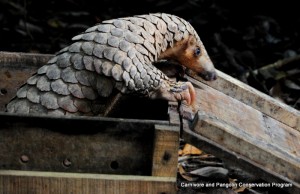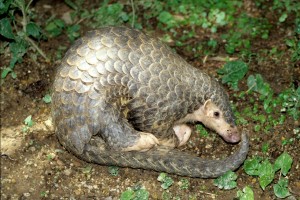The pangolin is literally being eaten out of existence according to the latest IUCN Red List update which shows that all eight species are now threatened with extinction. The latest update means that all species of pangolins are now EDGE species.
The IUCN SSC Pangolin Specialist Group, which is hosted by the Zoological Society of London (ZSL), warns that pangolins are now the most illegally traded mammal in the world, with more than one million individuals believed to have been snatched from the wild over the past decade.
Watch video – Eating Pangolins to Extinction

Despite a commercial trade ban for wild-caught pangolins in Asia, the illegal trade is thriving. Consumers are willing to pay increasingly high prices for their meat, which is being plated up at banquets across the East as a luxury food. Their scales are also used in traditional Asian medicines to treat a range of ailments.
The Chinese pangolin (Manis pentadactyla) and Sunda pangolin (M. javanica) were previously listed as Endangered and ranked 91st and 92nd on the EDGE mammals list respectively. The Red List Update has moved them up to Critically Endangered due to suspected declines of around 80% in the last few decades. This will see them rise up the EDGE list in the near future.

The Indian pangolin (Manis crassicaudata) has been reclassified as Endangered along with the Philippine pangolin (M. culionensis). The four African pangolins have been assessed for the first time as Vulnerable which means they will all feature within the top 300 EDGE mammals. We will be updating the EDGE mammals list to reflect these changes very soon. Sign up to the free EDGE e-newsletter to be the first to see our new top 100 EDGE mammals.
The IUCN SSC Pangolin Specialist Group is today launching a conservation action plan which lays out the steps that need to be taken to clampdown on the illegal trade and secure the future of pangolins in Asia and Africa.
“All eight pangolin species are now listed as threatened with extinction, largely because they are being illegally traded to China and Vietnam,” says Professor Jonathan Baillie, Co-Chair of the IUCN SSC Pangolin Specialist Group and Conservation Programmes Director at ZSL.
Dan Challender, Co-Chair of the IUCN SSC Pangolin Specialist Group, says: “Our global strategy to halt the decline of the world’s pangolins needs to be urgently implemented.

“A vital first step is for the Chinese and Vietnamese governments to conduct an inventory of their pangolin scale stocks and make this publically available to prove that wild-caught pangolins are no longer supplying the commercial trade.”
The new action plan ‘Scaling up pangolin conservation’ focuses on protecting pangolin strongholds in Asia and Africa, helping local communities move away from poaching, the strengthening of legislation, and most importantly, understanding and reducing consumer demand.
The conservation recommendations were developed at last year’s IUCN SSC Pangolin Specialist Group Conservation Conference, which was attended by EDGE Programme Manager, Carly Waterman, and EDGE Fellow Ambika Khatiwada. The EDGE of Existence programme has already supported projects focusing on the conservation of the Sunda and Chinese pangolins and we look forward to supporting the IUCN SSC Pangolin Specialist Group to implement the new action plan.